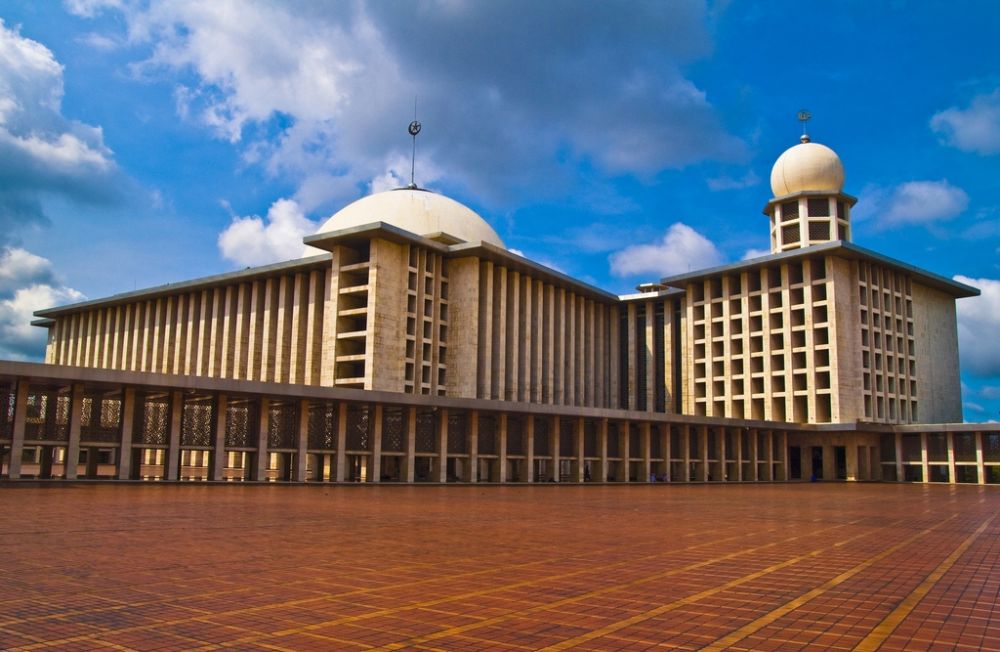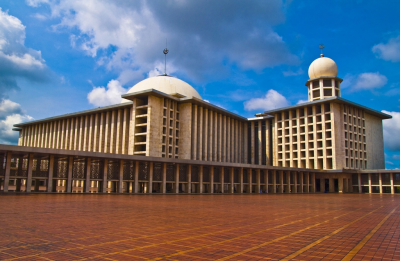

Explore the magnificent Istiqlal Mosque, the largest mosque in Southeast Asia, and delve into the rich history and cultural significance of this religious landmark on a guided cultural tour. You will learn about the mosque's intricate architecture, which reflects both Islamic and Indonesian aesthetics, and the philosophy behind its design. The mosque's name, 'Istiqlal,' means 'independence,' symbolizing the Indonesian people's struggle for freedom. Visitors are welcome to observe the grand hall, capable of accommodating thousands of worshippers, and the impressive dome, which spans over 45 meters in diameter. The tour also includes a visit to the minaret, offering panoramic views of Jakarta. Note that appropriate attire is required, and women may be asked to wear a headscarf while inside the mosque.
Participate in a profound spiritual encounter by joining the local community for one of the five daily prayers at Istiqlal Mosque. This activity allows visitors to witness and experience the Muslim practice of Salat in a congregation. Visitors will be briefed on the etiquette of attending prayers, including the removal of shoes and the proper dress code, before entering the main prayer hall. The tranquility and unity of communal prayer within the vast, echoing space of the mosque offer an unparalleled opportunity for reflection and connection with the divine. Visitors interested in this experience should be mindful of prayer times, which change slightly every day according to the position of the sun.
Join the joyful and bustling celebration of Eid al-Fitr at the Istiqlal Mosque, marking the end of the Islamic holy month of Ramadan. This is one of the most significant Islamic festivals, and the mosque attracts thousands of worshippers for the special Eid prayer. Observing or partaking in the prayer offers a unique insight into Islamic customs and the significance of this holy day in the Muslim calendar. Post-prayer, the atmosphere around the mosque is festive and family-oriented, with food stalls selling traditional foods and sweet treats. Visitors should be aware that the mosque will be particularly crowded during this time, and they should plan accordingly to navigate the crowds and immerse themselves in this cultural experience.
Experience the Islamic New Year, also known as Hijri New Year, at the Istiqlal Mosque. This event marks the beginning of the new lunar Islamic calendar year. Visitors can join in the lectures and recitations that reflect on the migration (Hijrah) of Prophet Muhammad from Mecca to Medina, which is the event the Islamic calendar commences from. Community members gather to pray, exchange stories, and set intentions for the year to come. It's a time for spiritual renewal and communal bonding. The mosque often hosts religious scholars who provide insights into the significance of the event and offer inspirational talks.
Istiqlal Mosque is not only a place for Islamic worship but also a hub for interreligious understanding and harmony. Throughout the year, the mosque holds interfaith dialogue sessions meant to foster mutual respect and understanding among different religious communities. The sessions include discussions on various topics related to religion, peace-building, and cooperation. Participants have the opportunity to ask questions, share perspectives, and engage in constructive conversations about faith. These dialogues are typically moderated by religious leaders and scholars who guide the discussion ensuring a respectful and enlightening environment for all attendees.
Istiqlal Mosque occasionally hosts calligraphy workshops for those interested in the art of Islamic calligraphy. These workshops showcase the beauty and intricacy of this art form, which is an important aspect of Islamic culture. Participants will learn about the various styles of Arabic calligraphy and get hands-on experience with traditional tools such as the qalam (a type of pen made from a reed). Expert calligraphers will guide you through the techniques required to create beautiful script. The workshop is a wonderful way to engage with Islamic artistic traditions and leave with your own piece of handcrafted art.
During the holy month of Ramadan, Istiqlal Mosque hosts daily iftar gatherings, where Muslims break their fast together at sunset. The iftar meal at the mosque is a special occasion, with people from all walks of life sitting side by side to share food and companionship. Visitors are welcome to join this communal breaking of the fast, which usually starts with the consumption of dates and water or sweet drinks, followed by a prayer, and then a full meal. This activity not only offers an insight into Islamic customs but also serves as a unique cultural experience as you engage directly with the local community.
Istiqlal Mosque provides religious education classes for those interested in learning more about Islam. These classes cover a range of topics, from the basics of the faith to more in-depth discussions of the Quran, Hadith (sayings of the Prophet Muhammad), and other aspects of Islamic practice. The classes cater to both children and adults, with different sessions tailored to each group's needs. The classes are taught by knowledgeable instructors and offer an excellent opportunity for personal growth and understanding of the Muslim faith.
With its unique blend of Indonesian and Arabic architectural styles, the Istiqlal Mosque is a fascinating study subject for architecture enthusiasts and students. Structured study tours provide insight into the design principles that architect Frederich Silaban employed when the mosque was constructed in the 1950s. Visitors can admire the mosque's minimalist style, its open spaces that allow for airflow and natural lighting, the large pool used for ablutions, and the clever use of marbles and metals. These tours can be particularly enlightening for those interested in religious architecture, as the mosque combines a modern aesthetic with traditional Islamic design elements, embodying the spirit of independence and unity.
Istiqlal Mosque is not only a religious center but also a community hub, hosting various activities designed for the youth. These activities aim to engage young people in constructive and positive ways, providing them with a space to learn, socialize, and develop their skills. Events can include sports, educational seminars, charity work, and other community service projects. Such activities often take place during weekends or school holidays and are designed to promote personal development and community spirit among the younger generation. They serve as an excellent opportunity for local and visiting youth to make friends, contribute to society, and learn about Islamic teachings in a practical context.
